Afzal Guru dropped out of medical college, crossed LoC, returned and surrendered. His protracted struggle to survive without becoming a surrogate soldier or a recycled insurgent led him to the gallows. While his execution seemingly satisfied the “collective conscience”, it raised many questions over the conscience of the people in Kashmir who matter, reports R S Gull
“The decision to hang Guru appears to be a political one,” was the reaction of Chief Minister Omar Abdullah, many hours after the 2001 Parliament Attack convict was lowered in his Tihar grave. Right wingers, Omar told various TV Channels, were accusing Congress of being soft towards terror. Though Home Minister Sunil K Shinde rejected the idea but this is a fact that Congress wanted certain spectacular performances before going to the 2014 elections that is aimed at installing Rahul Gandhi.
In Afzal’s case, unwittingly or deliberately, politics was played in Kashmir as well. That politics had led to a weak defence during trial and apparently a lackadaisical attitude of the major actors in the state towards the case. Even smaller things were ignored till the possibility of any intervention became impossible, at least in the trial court.
While it was public knowledge that Afzal was not getting a lawyer and the amicus curie appointed by the court to assist him was not pleading his case properly, there was no effort to help the family. There were many options available. Any local lawyer could have been deputed or the bar could have arranged a lawyer. There was also a possibility of any of the separatist alliances or parties hiring a lawyer as well. In worst case scenario, the state legal aid cell could have been activated and a lawyer could be arranged. Afzal was accused in a high profile case but he was a state subject after all.
But fundamental to this crisis was that the family did not approach anybody. “I am not aware of the realities that might have been there in 2002,” Aijaz Bedar, president Kashmir Bar Association said. “I do not know if the family ever sought any help.” Mian Abdul Qayoom who was re-elected as the president of the Kashmir Bar Association in 2004 told Kashmir Life that since then he and many other lawyers met him in Tihar six times. “Never ever did he ask us to arrange legal help,” Qayoom said. “Even his family never sought any help from the Bar Association.” Ideally, Qayoom said, it is better to have a Delhi lawyer for pleading in Delhi court but somehow that had not happened.
“People have asked why we did not represent Afzal at the time of his trial,” lawyers Nandita Haksar and N D Pancholi said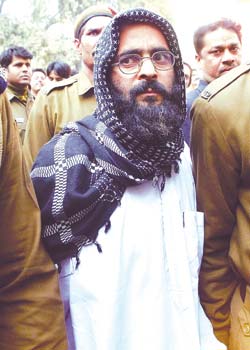 in a statement while withdrawing as counsels to Afzal’s family. “The simple truth is that we were never approached.” It was only after he was condemned to death, the letter said, his wife approached the two lawyers to write the mercy petition. “Without his vakalatnama we could not have even visited him in jail,” the letter said. “After Afzal was hanged the family members phoned us from Kashmir on the same day asking for help. In accordance with the wishes of the said family we have asked the jail authorities for permission to visit Afzal’s grave; and later for his belongs and also for his body.”
in a statement while withdrawing as counsels to Afzal’s family. “The simple truth is that we were never approached.” It was only after he was condemned to death, the letter said, his wife approached the two lawyers to write the mercy petition. “Without his vakalatnama we could not have even visited him in jail,” the letter said. “After Afzal was hanged the family members phoned us from Kashmir on the same day asking for help. In accordance with the wishes of the said family we have asked the jail authorities for permission to visit Afzal’s grave; and later for his belongs and also for his body.”
Sources close to the family said it was partial-ignorance and partial-poverty. Besides, there was lack of proper guidance for contesting the case. Initially Afzal was under the impression that the people who had “implicated” him will come to his rescue and later, when no support came, he used to tell people that he has “left everything to the Allah.”
In such situations, politicians intervene. But that did not happen at all. Perhaps all the politicians in the separatist camp were seeing emergence of a martyr in Afzal Guru, so neither of them intervened. And they would talk about it openly.
The US cables leaked by whistle-blower website Wikileaks has a major reference to this dichotomy in the separatist camp. In the cable 82638 that was dispatched from US mission in Delhi on October 20, 2006 the diplomats talked about the case in detail. JKLF leader Yasin Malik told the US officials that Afzal belongs to the vulnerable population of former combatants and many Kashmiris feel sympathy for Afzal. “Afzal’s only crime, Malik argued, was buying a car. How does this warrant a death sentence?” Malik was quoted saying in the cable.
In contrast, the cable refers to an unnamed moderate Hurriyat leader who tells them his faction of political separatists were remaining as quiet as possible about the issue because “they do not feel strongly that India should pardon Afzal.” While they were concerned that Afzal did not have adequate representation during parts of his trial, the cable notes, privately they say that he should be executed if he is guilty. “If someone is a terrorist,” zzz said, “they should meet a violent end.” The unnamed Hurriyat leader said politically, however, moderate members of the Hurriyat are unable to express this view publicly, given the mood in the valley and the threat from terrorists. “For this reason, the moderate Hurriyat as a body has remained relatively quiet about the issue,” the cable reads. “While some may speak on Afzal’s behalf individually, this was only out of a sense of obligation rather than strong conviction.
Albeit for different reasons, even Syed Ali Geelani would comment on similar lines. “Whether he (Guru) is hanged or not, we as Muslims have to remain happy and be content in both the cases”, Geelani told a seminar – Mohammad Afzal Guru: Hero of Our Resistance Movement that Muslim League organized in October 2006. He, however, told people that they should not discontinue protesting against the death penalty.
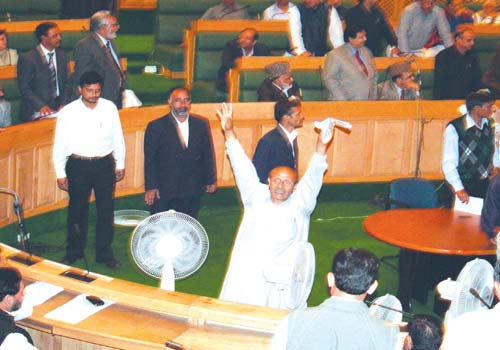
Guru, it is worth mention here, was in touch with Geelani. They would exchange letters and in early April 2010, Geelani even paid him a visit in the jail as well. Throughout, Geelani was aware that Guru is not getting a fair trial.
“I am not protesting for the release of Afzal Guru,” Masarat Aalam, the League leader, then at large, told the seminar. “What an honour for him to get hanged after Fajr (wee hour) prayers following holy Shab-e-Qadr and last Friday of Ramadan”.
The seminar was held at the peak of protests across Kashmir and parts of Jammu when an Additional Sessions Judge in Delhi fixed October 20, 2006, for Afzal’s execution. It followed the death penalty being upheld by the high court and the apex court on August 4, 2005. Following widespread disruptions, almost everybody including Chief Minister Ghulam Nabi Azad prevailed upon New Delhi to soft-peddle the issue. Then, Dr Farooq Abdulah had suggested Azad to “lead an all-party delegation” to the President against the hanging because “it will disturb the peace process and provide no solution.” Immediately after, Afzal’s mother, wife and son drove to Delhi and handed over a mercy petition to the then President Dr A P J Abul Kalam.
The unionist mainstreamers have their own Afzal story. They did not want him to be hanged because they believed it would add yet another immortal character to contemporary history after Maqbool Bhat. They made speeches but could not take the issue as decisively as, for instance, the Akalis in Punjab did for the killers of Beant Singh or the Tamil Nadu house did for the assassins of Rajiv Gandhi.
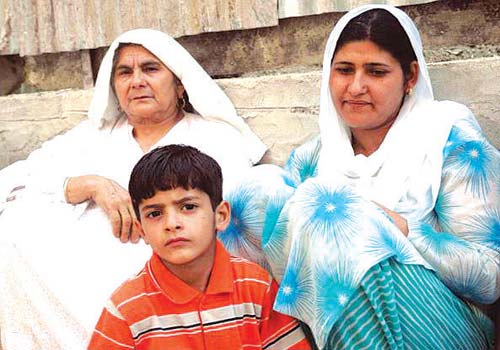
Take, for instance, Omar Abdullah, J&K chief minister. Ever since he became the Chief Executive of India’s most sensitive state, he has been aware that Afzal Guru is a Damocles’ Sword. “I will not do it,” Omar said in June 2010, when asked if he would put his signs on Guru’s death warrant. “I am against death sentence and I want to make it clear that if I am required to sign Afzal Guru’s death warrant, I will not do it.” He knew the reasons and didn’t want to follow his dad who signed Maqbool Bhat’s black warrant. “The hanging of Maqbool Bhat did not solve any issue but created more complications.”
Omar was upset when Home Minister informed him barely 12 hours ahead of the execution. As Kashmir is under curfew blanket, Omar, since then, is consistently explaining how he lacked a role in the entire episode and how it could have been slightly less painful.
“I wish we were the ones authorized to give the news to the family,” Omar told a TV channel. “I find it very difficult to reconcile with the fact that we executed a convict without his family members seeing him one last time. There is something wrong in the system if we are sending information through Speed Post in this era. We could have easily got the family to meet him in Delhi and kept it a secret.” This was despite the fact that he had the “premonition” – he actually was informed about the hanging (not the date) in Delhi on January 31 – that Guru would be executed sooner than later.
In another interview, Omar was slightly critical of the circumstances that led to Guru’s hanging. He talked about the unfair trial and asserted the people are not hanged for “satisfying the collective conscience” of the society. “You don’t hang people because the society demands it,” he said. “You hang people because the law demands it.”
But this was post-execution. Omar government had closed doors for Afzal when the latter was desperate to be shifted to Srinagar Central Jail until the President decides his mercy petition. He had only one ground for the request – “His family was facing problems in coming to Delhi”.
The application was moved in 2009. When the state government received the letter, it rejected it citing no reason. The rejection was conveyed (Home Department notice no: F.9/51/2010/HG-3333) in July 2010 and it leaked two months later. A year later, Afzal drafted another communication personally and handed over to the prison officials. It was also received by the state government. Afzal wrote to Geelani in 2011 that his request is gathering dust for a year somewhere in the J&K government office. Tragically, it was not even acknowledged. “Omar Abdullah Sahib has been telling newspapers that he has received no application for my shift to Srinagar,” Afzal tells Geelani in his letter.
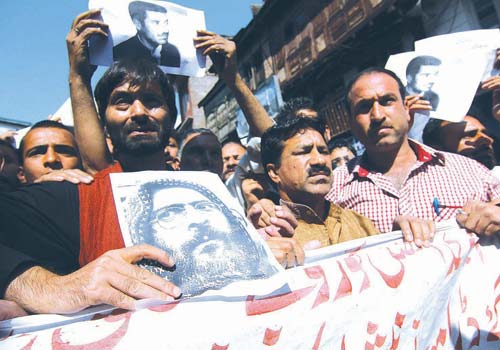
Afzal’s lawyers Nandita Haksar and ND Pancholi have stated in their letter that how the family was desperately seeking some sort of shelter in Delhi when his wife and mother went to Delhi to file the mercy petition. That time it was the PDP-Congress coalition ruling the state with Azad in the driver’s seat.
While these small facilities, not against the law, were denied, the politician in Omar never spared a chance not to use Afzal. A day after Tamil Nadu assembly passed a unanimous resolution on August 30, 2011, urging clemency for Rajiv Gandhi assassination convicts Murugan, Santhan and Perarivalan, lodged in Vellore Jail, Omar tweeted: “If J&K Assembly had passed a resolution similar to the Tamil Nadu one for Afzal Guru would the reaction have been as muted? I think not.”
It kept Omar in sharp media focus for many days. But his tweet did trigger independent lawyer and Omar’s erstwhile supporter Engineer Abdul Rashid to move a resolution. When the resolution was finally to be taken up on September 28, 2011, all the parties put up a remarkably intelligent show, creating a situation that entire business of the day was suspended amid frequent adjournments.
As BJP and Congress remained busy squabbling in the house, paralyzing it completely, regional parties NC and PDP watched the pandemonium without becoming part of it. They picked up old and forgotten issues to keep the house engaged. Congress, despite being a ruling party, was seen in the well and it including Deputy Chief Minister. It even resorted to violence.
Talking to reporters after the house was adjourned for the day, Omar said he personally is opposed to capital punishment because it will create a “martyr” and boost the militancy. “Left to rot in jail is better,” he said, adding, “If hanged, he becomes a martyr.” He said discussing the clemency issue can divide J&K state. Resolution mover Rashid termed the “drama” a “well-planned conspiracy” scripted in Delhi and “NC, Congress, BJP and the PDP played it”.
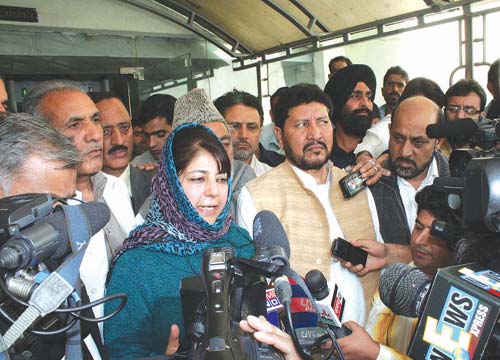
Rashid raked up the issue again on February 27, 2012, in Jammu. His resolution for the session was dismissed. “I am just seeking a debate on the issue and nothing more,” he shouted. As the noisy lawmaker disrupted the proceedings, everybody opposed him. BJP accused him of being a Pakistani. Panthers Party members alleged him to be working for India’s intelligence agencies. Congress members dubbed him and his noise useless. An NC member even termed him “nuisance”. They all strongly suggested the Speaker to “throw him out”. The rare bonhomie between BJP, NC, Congress and Panthers Party encouraged Speaker to order Rashid should be “immediately marshalled out”.
As he was being bundled out, PDPs Mehbooba Mufti intervened saying the house is ignoring the genesis of the debate on clemency issue that Chief Minister triggered. As she was still speaking on the subject, Engineer jumped in and entered into a verbal duel with her. “You can not absolve yourself from what you did,” said Rashid who believes all the parties actually ganged up to ensure his resolution was not taken up ever.
The last action of Rashid was to handover a resolution to Pranab Mukherjee for clemency to Afzal when he flew to Srinagar to seek their votes for the presidential election on July 16, 2012. The engineer was the only lawmaker who was arrested within minutes after Afzal was hanged.
The media space is still used in Afzal’s name. “Why don’t we see the BJP clamouring for execution of Beant Singh’s killers or the Rajiv Gandhi’s killers?” asked Omar in his last TV interview on the issue. “If that was to be the last execution on who people who attacked Indian democracy, I would call it a political decision.”
Well before his death became a requirement for politics, Afzal was tormented by many things that pained him. His letters are full of the pain that a system controlling the Kashmir society gave him. His battle to survive and raise a family without returning to militancy or becoming an informer was very costly. His entire focus was to somehow see his family remaining unscathed in the situation they were living in. His letters bear it all.
“The people who are able to pay in terms of cash are not forced to do the dirty things the way I did as I was not able to pay,” Afzal wrote in his letter to his lawyer in the apex court Sushil Kumar. He mentioned details of a Parimpora policeman, xxxx who had extorted Rs 5000 from him after threatening him that he will implicate him for selling duplicate medicines. The same cop, the letter said, became a witness against me. “He was knowing (sic) me before parliament attack. In the courtroom, he told me in Kashmiri that my family is ok indirectly it was a hidden threat which the designated court hardly could realize,” the letter reads.
Afzal even taught kids of relatives of the cops so that he gets some space to survive. He even regrets in many of his letters that his wife had to sell her jewellery to pay for his freedom when STF officers sought Rs 1 lakh. They took Rs 80000 in cash and his newly acquired scooter for Rs 20000 balance!
“I remained a frustrate (sic) bewildered and confused between the security and safety of myself and my family,” Afzal wrote in one of his letters. “I protected and saved my family. That is how I am lying in death-row.”


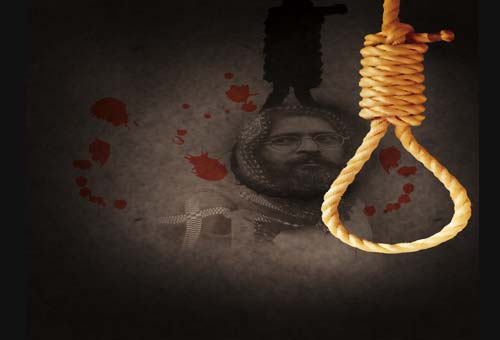














Nice articulated. Missed by the most of the media houses, you provided the alternate narrative. We as a society should see what we are did, not only to Afzal Guru, but to many thousands who laid their lives for our struggle. Giving sermon from cozy rooms is easy, but to bear the brunt is what matters.
Anyways Kashmir Life, you always give your readers something different!
As you said that its all political,what they will get after this,,,chair only…how this social animal is so selfish.they are sitting on the spots of innocent people. he got caught that’s why he is culprit.these political leader day by day are doing such a irresistible crime that they are being hanged not by one time.that is why if in this world injustice is the justice..but these foolish people do not know there will be day when every thing will be crystal clear that is the day of real judgement. there the judge is not an ordinary man like U.S president or Chief justice of any country..He is the Almighty The creator, sustain er and the destroyer.